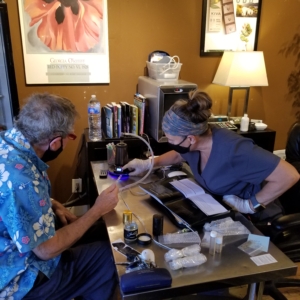Medical Cannabis Practitioner Certification Course — California
Introduction
Founded in 2006, the Medical Cannabis Caregivers (MCC), located at 52 N. Mentor Avenue in Pasadena, has served as an educational and clinical training resource for California’s medical cannabis industry.
Since 2016, MCC has provided clinical training for health care professionals working with patients who have a physician’s approval for medicinal cannabis use.
The California Department of Social Services (CDSS) has approved MCC to teach California’s Medicinal and Adult-Use Cannabis Regulation and Safety Act (MAUCRSA) through its Continuing Education Program for state residential care facility licensees.
Course Information
Title: California Medical Cannabis Practitioner Certificate Course
Format: LIVE one-on-one online instruction
Length: 15 hours, divided into five (5) Modules. Each Module is three (3) hours.
Method of Instruction: Course participants schedule their on-line training sessions with the Instructor
Completion timeline: Participants have up to two (2) weeks after registration, to complete the Course.
Prerequisites: No prerequisites. Must be 21 years of age.
Instructor
Liz McDuffie, founder of MCC, has more than 15 years of experience as a Medical Cannabis Practitioner. Liz is approved by the California Department of Social Services (CDSS) to teach California’s medical cannabis regulations through the CDSS Continuing Education Program for state residential care facility licensees. She continues to work with residential care licensees statewide to support safe, compliant, and effective cannabis use for patients.
Course Purpose and Objectives
The Course trains participants to deliver safe, informed, and regulatory-compliant guidance to patients considering cannabis as a medicinal treatment option. Course participants include nurses, physical therapists, chiropractors, massage therapists, pharmacists, acupuncturists, and caregivers.
Learning Outcomes
Participants will:
A. Gain the knowledge and skills needed to assist patients in the effective therapeutic use of cannabis.
B. Learn the regulatory limits and legal responsibilities of a Medical Cannabis Practitioner.
D. Receive hands-on clinical training in patient consultation and data collection.
E. Learn how to establish and expand a patient base.
Module Overview
MODULE I — Foundations of Medical Cannabis
- Cannabis as Complementary and Alternative Medicine (CAM)
NIH recognition; SB 577 Practitioner classification. - State Regulations for Medicinal Use
Possession, workplace rights, DUI, federal law, product sources, tax exemption. - Physician Approval Requirements
DPH forms, renewal, online approvals, and patient benefits.
MODULE II — Legal Protections, Intake, and Compliance
- DPH Medical Marijuana Identification Card Program — Benefits and safeguards
- Liability Protection under SB 577 — Required Disclosure Statement
- Patient Intake & HIPAA Requirements — Forms, documentation, privacy compliance
MODULE III — Pharmacology & Treatment Design
- The Endocannabinoid System (ECS) — Receptors, signaling, clinical implications
- THC vs. CBD — Therapeutic properties, contraindications, condition-specific benefits
- Determining the Optimum Formula
CBD:THC ratios, carriers, terpene/cannabinoid profile, co-morbidities
MODULE IV — Administration, Safety, Product Evaluation
- Forms of Ingestion
Onset, duration, bioavailability; nano-emulsions; inhalation, oral, sublingual, transdermal, rectal, topical - Dosage
Titration; managing adverse reactions; side effects; drug interactions; storage - Product Evaluation
Labeling, testing, chemovars, extraction methods, full-spectrum vs isolate, licensed vs legacy markets
MODULE V — Clinical Training & Practice Development
- Clinical Training (4 Hours)
Supervised Case Review & Practitioner Service Methods - Collecting Patient Outcome Data
SurveyMonkey, SquareUp, JotForm; HIPAA-compliant data management - Building a Practitioner Patient Base
Working with Residential Care Facilities, Cancer Support Groups, and community partners
Grading Policy
A minimum score of 175 out of 250 points is required to successfully complete the course.
These points are earned through correct answers on the course quizzes.
Materials
All required readings are provided digitally.
Content draws from government, clinical, academic, and private-foundation research.
Bibliography is included.
Fees, Refunds, and Certification
Course Fee: $449 Payment Option: Split Course Fee – 50% on Registration with balance due in 30 days.
- Refund: Full refund upon request
- Certification: A Certificate is issued upon successful completion.
Registration:
Submit the Registration Form located below the Course Description.
Confirmation of Registration is provided within 24 hours.
Medical Cannabis Practitioner Course Registration
For More Information
We’re here to help and answer any questions you might have.
We look forward to hearing from you!

